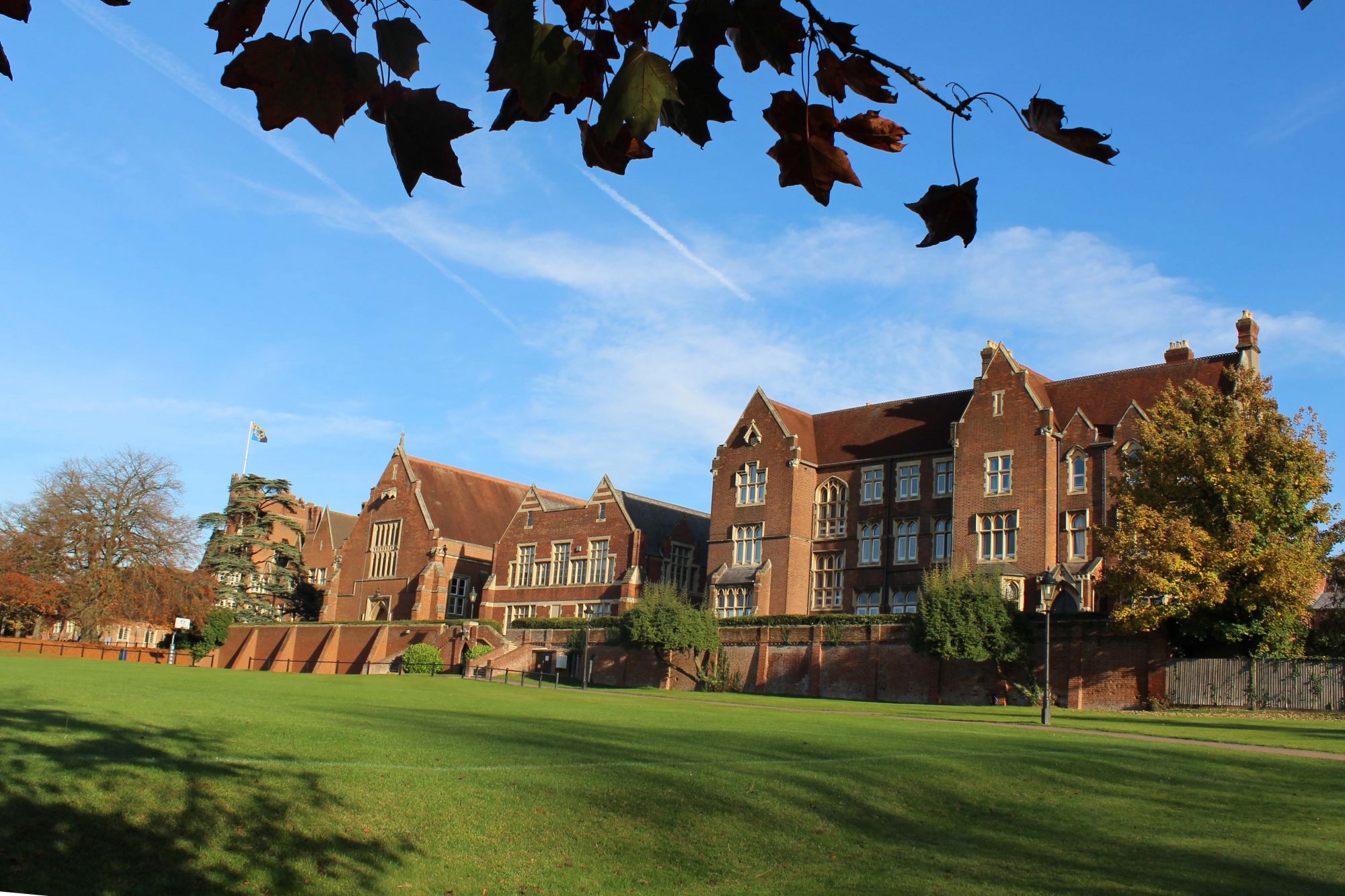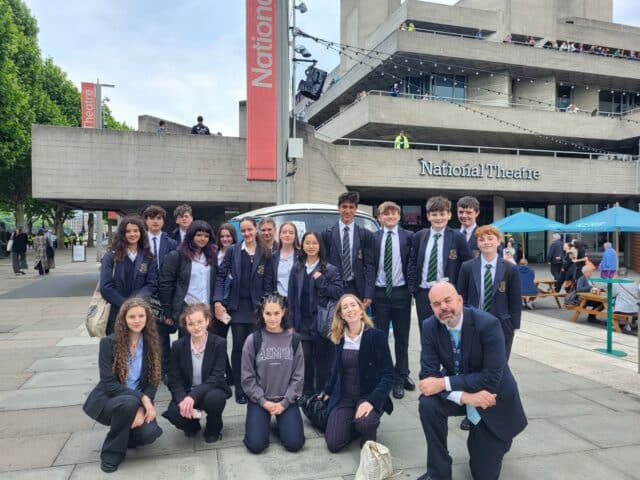Epsom College has received a glowing ISI Inspection report, with inspectors awarding the College the top grade of ‘excellent’ in all areas.
Following the inspection in February, inspectors comment that our pupils “demonstrate commitment to excellence in all areas of learning; they do not settle for mediocrity and express confidence in the culture of the school that inspires them to be the best they can be.”
ISI inspections judge schools to be either ‘unsatisfactory’, ‘sound’, ‘good’ or ‘excellent’ and then make recommendations as to where schools can further improve. They focus on pupils’ academic and other achievements, and their personal development.
Across all measures, inspectors judge Epsom to be ‘excellent’. They make no recommendations for improvement; an achievement that is extremely rare.
“It is very rare for a school to receive a report without recommendations,” comments Jay Piggot, Headmaster. “As the Lead Inspector made clear in her feedback, the ISI team may only make recommendations where there is clear evidence of a need for improvement and no such evidence was found at Epsom.”
Nine inspectors observed lessons, conducted interviews with pupils and looked at their work. They held discussions with members of staff and the chair of governors, observed co-curricular activities, attended chapel, tutor meetings and assemblies. Inspectors also analysed responses to parent and pupil questionnaires.
Inspectors speak highly of the school’s inclusive and welcoming community, the broad diverse curriculum and the rich opportunities for academic extension and independent learning.
“The overall achievement of pupils is excellent reflecting Epsom’s ambitious aim to prepare them for eventual entry to the most competitive universities,” the reports states.
“Throughout the school, pupils develop higher order thinking skills, stimulated by a broad and challenging curriculum. Senior pupils demonstrate an outstanding ability to synthesise sophisticated material and develop considered hypotheses in areas of their own academic interest. This is evident from the independent academic projects and the extended project qualifications completed as optional enrichment activities.”
“I am pleased that the inspection report acknowledges the advancement of the College in recent years,” says the Headmaster. “This progress has been, and continues to be, a collective effort from all members of the College community and I thank governors, parents, pupils and staff for all we have achieved. It has been and remains a pleasure.”
Pupils’ Academic and Other Achievements – ‘excellent’ say Inspectors
“The quality of the pupils’ academic and other achievements is ‘excellent’,” the report notes. “Pupils’ communication skills are excellent, they speak articulately, debate confidently and with assurance, and apply these skills highly effectively across the curriculum. They make excellent academic progress over time, and levels of achievement are high.”
Commenting on pupils’ attitudes to learning, the inspectors say Epsom’s pupils “are exemplary; they are creative, take risks and engage with or create opportunities for new and varied learning.”
Pupils’ Personal Development – ‘excellent’ say Inspectors
Epsom not only scores highly for the academic performance of its pupils, but also for its pastoral care and the personal development of its pupils.
“Pupils are sensitive towards other cultures and traditions; they are honoured to be part of a cohesive and yet diverse community,” inspectors say. “The commitment to inclusivity, which is a strength of the school, is a result of the dedication of the leadership to the aspirational and supportive ethos, to which pupils readily respond.”
Inspectors comment on the strong relationships between staff and pupils, but also the links between pupils of different ages, backgrounds and gender. “Pupils collaborate very effectively and genuinely enjoy opportunities to work together to achieve common goals, be they in lessons, or outside the school community.”
“Pupils are socially and personally aware; they aspire to achieve, and older pupils act as positive role models for younger years.”
“The College was founded in 1855 on the twin principles of Excellence and Benevolence,” the Headmaster says. “The ISI inspection report affirms that in this chapter of the history of the College we are endeavouring and succeeding to honour our founding intents.”
What the Inspectors Said
The full ISI Inspection report can be viewed here. We have selected some choice quotes below:
Academic excellence
“The overall achievement of pupils is excellent reflecting Epsom’s ambitious aim to prepare them for eventual entry to the most competitive universities.”
“Pupils’ knowledge, skills and understanding across all areas of learning are excellent. Pupils demonstrate confident speaking and debating skills in their own and other languages.”
Pupils’ attitude to learning
“Pupils demonstrate commitment to excellence in all areas of learning; they do not settle for mediocrity and express confidence in the culture of the school that inspires them to be the best they can be.”
“Pupils participate actively in their own learning and this is fostered by a highly effective tutor system, along with the supportive and collaborative nature of both pastoral and academic staff.”
“Pupils of all ages show sophisticated study skills; they thrive on challenge and are prepared to tackle difficult problems without fear of failure. They show independence in working on personal projects beyond the curriculum, since they are encouraged by staff who, through targeted continuing professional development, have acquired a common understanding of what supports effective learning.”
Communication skills
“Pupils’ communication skills are excellent. They have many opportunities to practise these through discussion, including listening to talks, presentations in chapel or assembly, or in inter-house debates.”
“During discussions they listen carefully, demonstrating empathy for each other’s views. They are considered and self-assured in answering questions, without fear of getting things wrong. Pupils are confident communicators. Skilful questioning in lessons encourages their freedom of thought; positive working relationships facilitate the sharing of ideas.”
Numeracy
“Pupils have a high level of competency, knowledge and ability in numeracy. They apply these skills extremely well to other areas of their learning. They are confident in the application of mathematics, and this is further developed through extra-curricular enrichment activities such as the maths challenge and kangaroo competitions that they undertake with enthusiasm.”
Academic Enrichment
“The core curriculum, which enhances learning in the sixth form and the innovative use of independent academic projects with younger pupils, have enabled them to acquire exceptional knowledge and skills.”
“Throughout the school, pupils develop higher order thinking skills, stimulated by a broad and challenging curriculum. Senior pupils demonstrate an outstanding ability to synthesise sophisticated material and develop considered hypotheses in areas of their own academic interest. This is evident from the independent academic projects and the extended project qualifications completed as optional enrichment activities.”
Co-curricular opportunities
“Outside the classroom, they embrace the enrichment opportunities provided by a broad and varied extra-curricular programme. Pupils are positive and appreciate what they describe as the school’s ‘can do’ environment, in which they feel able to take risks and try new things. They are highly motivated.”
“Pupils participate with great energy and commitment in the wide range of enrichment opportunities provided to support the curriculum, whilst also achieving high levels of success in extra-curricular activities.”
“Pupils are resilient. They spoke positively about being pushed out of their ‘comfort zone’ and also about the confidence that they had gained from succeeding when, for example, they completed a chapel reading or led a Young Enterprise group in bidding for project rights.”
Sport
“They are successful in sport, whether representing the school, the county or the nation. They are nurtured by a sports programme that encompasses personal training, nutrition, strength and conditioning.”
Leadership
“Pupils of all ages develop leadership skills through, for example, participation in the Combined Cadet Force, or by leading a delegation in the Model United Nations competition, in which both teams and individuals have had notable success.”
Performing arts
“They seize opportunities to showcase their talent in performances of plays, house soirees or ‘live lounge’ performances. They relish opportunities in all areas of drama, achieving skill in directing or writing pieces, as well as acting in them.”
Music
“Musically, pupils achieve at a high level in individual vocal or instrumental work, or through activities including the chapel choir, the barber shop, the concert band, or one of the many ensembles.”
The Arts
“Pupils spoke enthusiastically of the breadth of opportunities available within the arts, which they felt to be on an equal footing with academic and sporting activities.”
Pastoral Care
“Pupils demonstrate an excellent level of self-knowledge in the consideration of their own learning and habits. This security is founded upon the positive relationships with tutors and house staff.”
“Pupils spoke sensitively about the importance of their own well-being. They were open about the ways in which they would seek support if they needed help, showing an appreciation for the outstanding level of pastoral care and guidance they had received.”
Behaviour and discipline
“Pupils have high levels of empathy and tolerance towards each other. They are extremely well behaved, mature and responsible in regulating their own conduct, as well as the conduct of others.”
“Rules and the importance of good relationships in the community are regularly reinforced. As a result, pupils have an excellent understanding of what is right and wrong, along with the impact of their own behaviour on others.”
Peer-to-peer relationships
“Pupils collaborate very effectively and genuinely enjoy opportunities to work together to achieve common goals, be they in lessons, or outside the school community.”
“Pupils are socially and personally aware; they aspire to achieve, and older pupils act as positive role models for younger years. Pupils of different ages work together in ‘families’ within the house.”
Diversity, inclusivity, community
“Diversity and difference are celebrated, and pupils are able to play to their individual strengths. They are inclusive and supportive of each other, irrespective of cultural differences.”
“Pupils show a clear respect and tolerance for each other’s differences, which is reflected in the inclusive ethos of the school. Pupils come from a wide range of geographic, social, economic and cultural backgrounds. Regardless, diversity and difference are respected and celebrated in an open, tolerant and harmonious community.”
“Pupils are sensitive towards other cultures and traditions; they are honoured to be part of a cohesive and yet diverse community. The commitment to inclusivity, which is a strength of the school, is a result of the dedication of the leadership to the aspirational and supportive ethos, to which pupils readily respond.”





